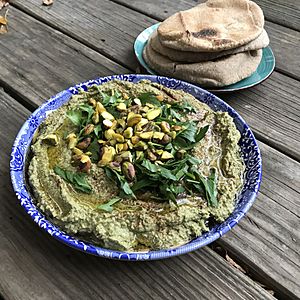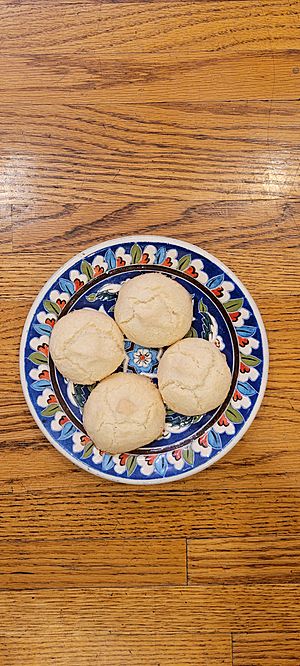Nawal Nasrallah facts for kids
Quick facts for kids
Nawal Nasrallah
|
|
|---|---|
| Born |
Baghdad, Iraq
|
| Alma mater | University of Baghdad (MA) |
| Occupation | Food writer, food historian, English literature scholar, translator |
Nawal Nasrallah is a talented writer and historian from Iraq. She lives in the United States and is an expert on food. She writes about food history, studies English literature, and translates books from Arabic to English. Nawal is well-known for her cookbook, Delights from the Garden of Eden, which features delicious Iraqi cuisine. She also translates old Arabic cookbooks, like Annals of the Caliphs’ Kitchens. This book is a translation of a 10th-century cookbook from the Abbasid Caliphate era. Nawal has won many awards for her writing and translations.
Contents
Life and Amazing Work
Early Life and Education
Nawal Nasrallah was born in Baghdad, a big city in Iraq. She went to the University of Baghdad. There, she earned her Master of Arts degree in English and Comparative Literature. For her master's thesis, she compared two interesting novels. One was Robinson Crusoe from the 18th century by Daniel Defoe. The other was Hayy bin Yaqzan, a 12th-century book by the philosopher Ibn Tufail. Nawal showed how Ibn Tufail's work might have influenced Defoe's famous story. Her thesis was published in 1980.
Teaching and Moving to the U.S.
After her studies, Nawal taught English language and literature. She taught at the University of Baghdad and later at the University of Mosul. In 1990, she moved to Bloomington, Indiana, in the United States. While living in Mosul, Iraq, she became a great baker. She taught herself how to cook many American foods.
Sharing Iraqi Food with the World
Nawal released her Iraqi cookbook, Delights from the Garden of Eden, in 2003. This was during the U.S. invasion of Iraq. At that time, many Americans wanted to learn more about Iraq. Nawal said that food and food memories gave her comfort when things were tough.
In 2015, Nawal worked with a professor named Gojko Barjamovic. They created recipes based on what ancient Mesopotamians used to eat. They even organized a special dinner for scholars at Harvard University. In 2016, she also taught a class on Iraqi cooking in Italy.
Nawal has also shared recipes for perfumes, spices, and oils. In her book Treasure Trove of Benefits and Variety at the Table, she translated over 750 recipes. These recipes were from 14th-century Mamluk Egypt. The book also talks about how people back then thought food could heal and make you feel better.
Cooking and Cookbooks
Delights from the Garden of Eden
Nawal Nasrallah published her Iraqi cookbook, Delights from the Garden of Eden, in 2003. This amazing book has more than 400 recipes! It won the Gourmand World Cookbook Awards in 2007. The book also shares interesting facts about Iraqi food history. It tells stories about the different regions of Iraq where the recipes come from. Many people loved the book. Nawal said she wanted to write it because there wasn't much information about Iraqi food history. Especially at a time when the news about Iraq was often negative.
A shorter version of Delights from the Garden of Eden came out in 2013. Saveur magazine even named it one of the top ten best cookbooks of that year.
Online Presence and Media
Nawal has been in many interviews and discussions about food and history. You can find some of these on YouTube. She also regularly updates her blog with old Arabic recipes. In 2023, The New York Times featured her 13th-century recipe for "Medieval Hummus."
Scholarly Works and Research
Expert in Medieval Arab Cuisine
Nawal Nasrallah is a true expert on medieval Arab cooking. She knows a lot about old Arabic cookbooks and the food of modern Iraq. She also studies the food of ancient Mesopotamia. She has even created materials to help people learn Iraqi Arabic.
In 2007, Nawal translated the oldest Arabic cookbook we still have. It's called Kitab al-tabikh, which means "The Book of Cooking." It was written by a 10th-century writer named Ibn Sayyar al-Warraq. Nawal used different copies of the old book from places like Oxford, Helsinki, and Istanbul. In 2008, she received an honorable mention award for this translation. This cookbook has recipes that its author collected from over twenty other cookbooks. Scholars use this book to learn about what important people ate long ago. They also learn how food was prepared and served, which helps with archaeological research.
Books on Food History
In 2011, Nawal published Dates: A Global History. This book explores the history of dates. It talks about how healthy they are, their cultural importance, and their symbolic meaning. The book also explains how dates grow and the legends connected to them. For example, it mentions the Greek myth of the date palm's link to the phoenix. This myth even influenced the scientific name for the date palm, Phoenix dactylifera.
In 2017, Nawal translated another 14th-century cookbook from Egypt. Its Arabic name is Kanz al-fawāʾid fī tanwīʿ al-mawāʾid. In English, it's called Treasure Trove of Benefits and Variety at the Table. In this book, Nawal also included ways to make some of these old recipes in modern kitchens.
More recently, in 2019, Nawal Nasrallah wrote for a book about ancient Mesopotamian texts. These texts are from Yale University’s Babylonian collection. She included recipes found on ancient cuneiform tablets.
Her 2021 translation of Best of Delectable Foods and Dishes from al-Andalus and al-Maghrib was also recognized. This cookbook was written by a 13th-century scholar named Ibn Razīn al-Tujībī. Nawal's translation was shortlisted for the 2022 Sheikh Zayed Book Award.
 | William Lucy |
 | Charles Hayes |
 | Cleveland Robinson |



